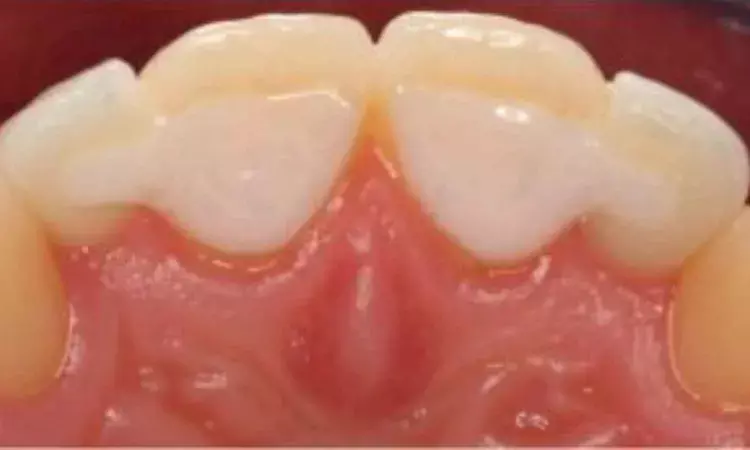- Home
- Medical news & Guidelines
- Anesthesiology
- Cardiology and CTVS
- Critical Care
- Dentistry
- Dermatology
- Diabetes and Endocrinology
- ENT
- Gastroenterology
- Medicine
- Nephrology
- Neurology
- Obstretics-Gynaecology
- Oncology
- Ophthalmology
- Orthopaedics
- Pediatrics-Neonatology
- Psychiatry
- Pulmonology
- Radiology
- Surgery
- Urology
- Laboratory Medicine
- Diet
- Nursing
- Paramedical
- Physiotherapy
- Health news
- Fact Check
- Bone Health Fact Check
- Brain Health Fact Check
- Cancer Related Fact Check
- Child Care Fact Check
- Dental and oral health fact check
- Diabetes and metabolic health fact check
- Diet and Nutrition Fact Check
- Eye and ENT Care Fact Check
- Fitness fact check
- Gut health fact check
- Heart health fact check
- Kidney health fact check
- Medical education fact check
- Men's health fact check
- Respiratory fact check
- Skin and hair care fact check
- Vaccine and Immunization fact check
- Women's health fact check
- AYUSH
- State News
- Andaman and Nicobar Islands
- Andhra Pradesh
- Arunachal Pradesh
- Assam
- Bihar
- Chandigarh
- Chattisgarh
- Dadra and Nagar Haveli
- Daman and Diu
- Delhi
- Goa
- Gujarat
- Haryana
- Himachal Pradesh
- Jammu & Kashmir
- Jharkhand
- Karnataka
- Kerala
- Ladakh
- Lakshadweep
- Madhya Pradesh
- Maharashtra
- Manipur
- Meghalaya
- Mizoram
- Nagaland
- Odisha
- Puducherry
- Punjab
- Rajasthan
- Sikkim
- Tamil Nadu
- Telangana
- Tripura
- Uttar Pradesh
- Uttrakhand
- West Bengal
- Medical Education
- Industry
Direct composite bests zirconia resin-bonded fixed dental prostheses for single missing anterior tooth:Study

Researchers have found in a new study that Direct composites are better than zirconia resin-bonded fixed dental prostheses for single missing anterior teeth as they have the advantage of being less invasive and can be restored in a single visit.
This study aimed to compare the outcome of a simplified direct composite resin-bonded fixed dental prostheses without reinforcing fibers (CR-RBFDP) and resin-bonded fixed dental prostheses using zirconia (Zr-RBFDP). The clinical records of five private practice dental clinics and one university hospital were analyzed. Failure was defined as a RBFDP that was removed or remade for any reason. Survival analyses were performed using log-rank tests.
Results: A total of 45 patients (CR-RBFDP, n = 17; Zr-RBFDP, n = 28) were followed up for 3 years. Among the CR-RBFDP cases, 1 case of framework fracture and 2 cases of discoloration occurred, whereas among the Zr-RBFDP cases, 1 case of debonding occurred. The mean duration of observation was 21.9 months. The 3-year survival rate was 92.3 % for CR-RBFDP and 91.7 % for Zr-RBFDP. Log-rank test showed no significant difference (p = 0.78). Within the limitations of this short-term retrospective study, the survival rate of CR-RBFDP was not significantly different from that of Zr-RBFDP. Contrary to concerns regarding material strength, CR-RBFDP showed reliable results. This direct composite restoration has the advantages of being less invasive and being completed in a single visit. Despite differences in material strength, CR-RBFDPs without fiber reinforcement showed reliable short-term clinical results. This direct composite restoration has the advantage of being less invasive and can be restored in a single visit.
Reference:
Takaaki Sato, Keiichi Hosaka, Junji Tagami, Hirofumi Tashiro, Hitoshi Miki, Kazunori Otani, Miho Nishimura, Masahiro Takahashi, Yasushi Shimada, Masaomi Ikeda. Clinical evaluation of direct composite versus zirconia resin-bonded fixed dental prostheses for a single missing anterior tooth: A short-term multicenter retrospective study, Journal of Dentistry, Volume 151, 2024, 105401, ISSN 0300-5712, https://doi.org/10.1016/j.jdent.2024.105401.
Dr. Shravani Dali has completed her BDS from Pravara institute of medical sciences, loni. Following which she extensively worked in the healthcare sector for 2+ years. She has been actively involved in writing blogs in field of health and wellness. Currently she is pursuing her Masters of public health-health administration from Tata institute of social sciences. She can be contacted at editorial@medicaldialogues.in.
Dr Kamal Kant Kohli-MBBS, DTCD- a chest specialist with more than 30 years of practice and a flair for writing clinical articles, Dr Kamal Kant Kohli joined Medical Dialogues as a Chief Editor of Medical News. Besides writing articles, as an editor, he proofreads and verifies all the medical content published on Medical Dialogues including those coming from journals, studies,medical conferences,guidelines etc. Email: drkohli@medicaldialogues.in. Contact no. 011-43720751


